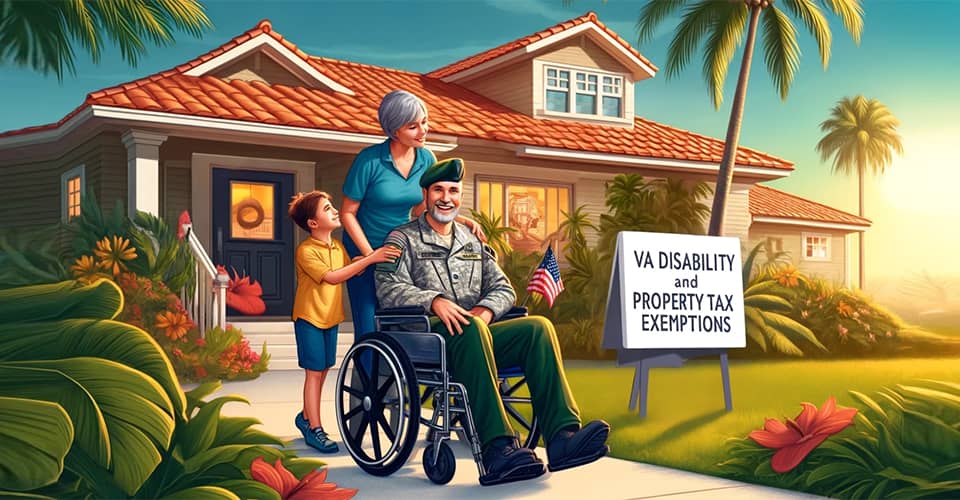Florida VA Disability and Property Tax Exemptions | 2025
In this article, we'll look at how you can determine if you qualify for these important money-saving programs. By the end, you'll know everything you need to maximize the benefit you can get from VA exemptions in Florida.
Table of Contents
- What Are VA Disability and Property Tax Exemptions?
- Benefits and Estimated Savings
- Eligibility Requirements
- Is VA Disability going up in 2025?
- Common Misconceptions
- Tips for Applying
- How to Get a VA Mortgage Loan
- Types of VA Loans Available to You
- Frequently Asked Questions
- Start Your Home Ownership Journey with VA Benefits
What Are VA Disability and Property Tax Exemptions in Florida?
In Florida, retired veterans with a service-connected disability may be eligible for a tax break, including property tax exemptions. The Department of Veterans Affairs runs these programs and offers financial help for veterans and their families.
To qualify for an exemption, veterans must meet certain requirements, including having a service-connected disability rating of 10% or higher from the United States Department of Veterans Affairs and being a legal resident of Florida when applying.
Additionally, veterans must renew their applications yearly to keep the property tax exemptions and provide extra documents if asked. Luckily, veterans who get this benefit can use it to improve their overall quality of life.

Benefits and Estimated Savings of VA Disability and Property Tax Exemptions
Disabled veterans in Florida can access a range of benefits that offer substantial financial relief and support, helping them to achieve greater economic stability and independence.
VA Disability Compensation
Monthly payments are provided based on the veteran's disability rating. Veterans can receive between $13,463 to $43,463 annually, depending on their disability rating and the number of dependents.
Property Tax Exemption for Disabled Veterans
This benefit offers an exemption on property taxes for homes used as primary residences by veterans with a disability rating of 10% or more. Annual savings can range from $500 to over $5,000, depending on the home's value and the veteran's disability rating.
Homestead Exemption
All Florida residents, including disabled veterans, can receive an additional property tax exemption. This typically adds about $50,000 to the exempted value, saving approximately $750 to $1,500 annually, depending on local tax rates.
Combat-Related Special Compensation (CRSC)
CRSC provides tax-free monetary compensation for retired veterans with combat-related injuries. The amount varies, offering potentially thousands of dollars annually in tax savings since this compensation is not taxed.
Sales Tax Exemption for Adaptive Equipment
Veterans can receive exemptions from sales tax when purchasing adaptive equipment, such as vehicles with special modifications for disabilities. Savings depend on the equipment cost but can amount to hundreds to thousands of dollars at purchase.
Reduced-Fee Licenses
Eligible disabled veterans can benefit from reduced driver's licenses and vehicle registration fees. This benefit typically saves veterans approximately $10 to $25 annually, depending on the specific fees and licenses.
The Requirements for VA Disability and Property Tax Exemption Eligibility in 2024
-
Service-Connected Disability: Must have a disability rating of 10% or higher from the U.S. Department of Veterans Affairs.
-
Residency: Must be a legal resident of Florida at the time of application.
-
Annual Renewal: You must renew the exemption application yearly.
-
Documentation: Provide additional documents if requested.
-
Honorable Discharge: Must provide proof of honorable discharge.
-
Proof of Disability: Must provide proof of disability rating.
-
Additional Exemptions: Eligible for a total exemption or homestead tax discount for military service.
- Surviving Spouses: In some cases, surviving spouses of first responders who died in the line of duty may also be exempt from ad-valorem taxation.
Source: Department of Veterans Affairs
Is VA Disability going up in 2025?
Yes, VA Disability compensation is expected to increase in 2025.
The projected Cost of Living Adjustment (COLA) for VA Disability rates is estimated to be 3.0%, effective from December 1, 2024, with payments beginning in January 2025. This increase is based on recent government data and inflation figures up to March 2024 .
For example, a veteran receiving VA Disability compensation at the 100% rate, currently getting about $3,621.95 per month for a single veteran without dependents, would see their monthly payment increase by approximately $108.66, bringing the total to about $3,730.61 per month starting in January 2025.
This adjustment helps to offset the cost of living increases veterans may face.
Common Misconceptions about VA Disability and Property Tax Exemptions in Florida
Many Floridians think a VA disability rating automatically makes them eligible for property tax exemptions. While it does give veterans certain advantages, disabled veteran property tax exemptions are not automatic in Florida.
To qualify for any exemption, the veteran must first prove their disability and have it rated 10% by the U.S. Department of Veteran Affairs (VA). They must then provide the County Property Appraiser's Office with proof of the rating to receive a homestead exemption.
Additionally, not all disabilities qualify for an exemption in Florida; they are limited to service-connected disabilities, such as injuries or illnesses related to active military duty.
Tips for Applying for VA Disability and Property Tax Exemptions in Florida
Understand Your Eligibility for Exemptions
If you are a veteran living in Florida, explore the available disability and property tax exemptions. If you qualify based on your service-connected disabilities, these can significantly reduce your financial burden.
Prepare the Necessary Documentation
To apply for these exemptions, you'll need to gather key documents, including your DD Form 214 (discharge papers), a VA award letter confirming your disability rating, and proof of Florida residency.
Visit the Department of Veteran Affairs website for a complete list of required documents and ensure you have everything ready before applying.
Apply Online for Convenience
The application process for both disability and property tax exemptions can be completed online, making it more accessible. Ensure all forms are filled out accurately and submit them through the appropriate online platforms.
Provide Detailed Service-Related Evidence
When applying for property tax exemptions, it’s crucial to provide detailed evidence that links your disability directly to your military service. This documentation is key to establishing your eligibility for specific exemptions.
Keep Your Financial Information Updated
Accurately report your financial status when applying. This information helps determine the level of property tax exemptions you’re entitled to, ensuring you receive the maximum possible benefits.
Stay Informed About Legal Changes
Keep up-to-date with changes in laws or regulations regarding VA disability and property tax exemptions in Florida. MakeFloridaYourHome can assist you in staying informed and understanding how these changes may affect your benefits.
How to Get a VA Mortgage Loan in Florida
The money you save from these exemptions can help you save up for a house, making it easier to get a VA loan to buy your home.
VA mortgage loans are available to military personnel regardless of their credit score or income level and require no down payment.
To receive a VA mortgage loan, veterans must obtain a Certificate of Eligibility (COE) from the US Department of Veterans Affairs. The COE will prove the veteran's eligibility for a VA home loan and must be presented to lenders when applying.
Additionally, many lenders in Florida offer special incentives for veterans who use VA mortgage loans. These incentives can include lower closing costs or discounts on other home-purchasing services.
The Types of VA Loans Available to You
If you're a veteran, active-duty military personnel, or a surviving spouse of a veteran, you may be eligible for a VA loan to buy, build, or refinance a home.
The Department of Veterans Affairs backs VA loans, offering various benefits such as competitive interest rates, no down payment requirement, and no private mortgage insurance (PMI) requirement.
Here's a closer look at some of the different types of VA loans you may be eligible for:
Purchase Loan
A VA-backed purchase loan can offer better terms than a private-lender loan if you want to buy a home.
With a VA purchase loan, you may be able to buy a home with no down payment, which can be a significant benefit if you don't have a lot of cash on hand. Additionally, VA purchase loans have competitive interest rates and don't require PMI.
To be eligible for a VA purchase loan, you must meet the VA's minimum service requirements, which vary depending on when and for how long you served.
Native American Direct Loan (NADL)
Suppose you're a Native American veteran or a veteran married to a Native American. In that case, you may be eligible for a NADL to buy, build, or improve a home on federal trust land.
The NADL program is designed to help Native American veterans access affordable housing on tribal lands. It offers various benefits, including no down payment, no PMI requirement, and low closing costs.
To be eligible for a NADL, you must be a Native American veteran or a veteran married to a Native American and meet the VA's minimum service requirements.
Interest Rate Reduction Refinance Loan (IRRRL)
If you already have a VA-backed home loan, you may be eligible for a VA-backed IRRRL to help reduce your monthly payments or make them more stable.
An IRRRL can be a good option if you want to take advantage of lower interest rates or if you want to switch from an adjustable-rate mortgage to a fixed-rate mortgage.
With an IRRRL, you can refinance your existing VA loan with little or no out-of-pocket costs. You must have an existing VA-backed home loan and meet the VA's minimum service requirements to be eligible for an IRRRL.
Cash-Out Refinance Loan
If you want to withdraw cash from your home equity to pay off debt, pay for school, or cover other needs, you may be eligible for a VA-backed cash-out refinance loan.
With a cash-out refinance loan, you can refinance your existing mortgage for more than what you currently owe and receive the difference in cash. Cash-out refinance loans have competitive interest rates and don't require PMI.
To be eligible for a cash-out refinance loan, you must have an existing VA-backed home loan and meet the VA's minimum service requirements.
Overall, VA loans offer a range of benefits for veterans, active-duty military personnel, and surviving spouses of veterans. If you're interested in buying, building, or refinancing a home, it's worth exploring your options for a VA-backed loan to see if it's the right choice.
Contact MakeFloridaYourHome.com or the Department of Veterans Affairs to learn more about VA loans and your eligibility.
FAQ: Florida VA Disability and Property Tax Exemptions | 2024
What specific steps should I take to apply for VA disability and property tax exemptions in Florida?
Begin by verifying your eligibility, gathering all necessary documentation like your DD214, VA award letter, and proof of residency. Apply online through the Florida Department of Veterans Affairs website, ensuring your application is thorough and accurate.
Can I apply for both VA disability and property tax exemptions if I only have a partial disability?
Yes, as long as you have a service-connected disability rating of at least 10% from the U.S. Department of Veterans Affairs, you can apply for property tax exemptions.
How often must I renew my property tax exemption in Florida?
You must renew your property tax exemption annually. It’s important to keep track of renewal deadlines to maintain your exemption status.
What happens if I fail to provide the requested documentation on time?
Failing to provide the necessary documentation by the required deadline can result in a delay or denial of your exemption. It's crucial to submit all requested information promptly.
Are there any additional exemptions available for disabled veterans beyond the standard property tax exemptions?
Yes, disabled veterans in Florida may qualify for total exemption or a homestead tax discount depending on the severity of their disabilities and other criteria.
How do I prove my disability is service-connected when applying for exemptions?
Provide a VA award letter or other official documentation from the Department of Veterans Affairs that clearly states your disability is service-connected.
Are surviving spouses eligible for the same VA disability and property tax exemptions in Florida?
Surviving spouses of veterans may be eligible for certain exemptions if the veteran had been receiving them at the time of their death and other conditions are met, such as the spouse not remarrying.
What additional benefits might I be overlooking as a disabled veteran in Florida?
Apart from property tax exemptions, consider applying for reduced fees on vehicle registrations and driver's licenses, and check eligibility for sales tax exemptions on adaptive equipment.
Can changes in my disability rating affect my eligibility for exemptions?
Yes, any change in your disability rating could affect your eligibility for exemptions. Regular updates to the VA and local tax boards about your disability status are essential.
Who can I contact for assistance if I encounter problems with my application?
For issues or questions regarding your application, contact the Florida Department of Veterans Affairs or a local Veterans Service Office. MakeFloridaYourHome can also assist in navigating these processes.
Start Your Home Ownership Journey with VA Benefits
If you're a disabled veteran in Florida, you have access to special benefits like VA disability payments and property tax breaks.
These benefits can make buying a home more affordable. Use them to help buy your own home, build up your home's value, and plan for a better future.
MakeFloridaYourHome is here to help you every step of the way, from checking if you qualify for a VA loan to finding your new home. Let's make it happen together.
With over 50 years of mortgage industry experience, we are here to help you achieve the American dream of owning a home. We strive to provide the best education before, during, and after you buy a home. Our advice is based on experience with Phil Ganz and Team closing over One billion dollars and helping countless families.

About Author - Phil Ganz
Phil Ganz has over 20+ years of experience in the residential financing space. With over a billion dollars of funded loans, Phil helps homebuyers configure the perfect mortgage plan. Whether it's your first home, a complex multiple-property purchase, or anything in between, Phil has the experience to help you achieve your goals.


 By
By  Edited by
Edited by 






